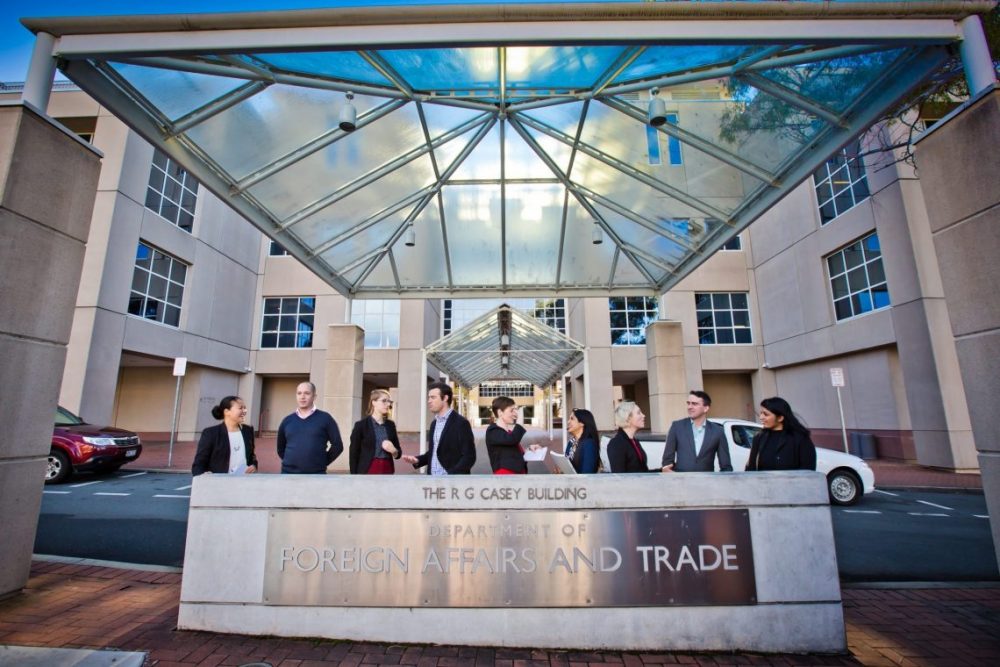DFAT needs a domestic policy division
Posted By Hugh Piper on April 12, 2022 @ 11:00

Australian foreign policy is characterised by the perpetual dilemma of grand strategy [1]: aligning lofty aspirations (shaping the Indo-Pacific) with limited resources (a population of 26 million [2] and relative economic decline). If Australia is to meet its ambitions, it must better marshal all its national assets. To this end, the Department of Foreign Affairs and Trade should develop a new policy capability to connect domestic policy agencies in Australia with those in the Indo-Pacific.
The provision of public goods [3] is increasingly a domain for strategic competition. Those who can provide ways and means to address difficult challenges facing societies—economic development, climate change, governance and health, to name a few—can not only win favour, but also help spread and entrench norms. This is precisely why Australia, both independently and through groupings like the Quad [4], has made public goods like infrastructure and vaccines key elements of its regional engagement.
Shadow Foreign Minister Penny Wong recently said [5], ‘Given the circumstances we face, we really need to deploy all aspects of state power: strategic, diplomatic, economic and social.’ One of Australia’s greatest assets is its sophisticated governance, underpinned by a well-resourced and highly qualified public sector. Australian federal, state and territory governments hold world-leading expertise in all aspects of social and economic policy. This public knowledge is supplemented by universities and think tanks.
Australia should see its domestic public policy infrastructure as a foreign policy asset. While DFAT, and other agencies, already fund capacity-building and technical assistance in the Indo-Pacific, much of this is ad hoc, limited to discrete projects, and often contingent on the initiative of individual diplomats. There are no mechanisms to track and leverage the influence this work generates.
The Australian Electoral Commission [6] and the Australian Transaction Reports and Analysis Centre [7] show the significant value domestic agencies can add to foreign policy goals: boosting electoral transparency and combating illicit finance promote good governance and show Australia to be a constructive regional player. These examples are, however, the exception. Most domestic policy agencies at the federal and especially state and territory levels understandably have little capacity to extend their efforts to the international sphere.
A more structured approach, facilitated by DFAT, is needed. Imagine, for example, investigators from the NSW Independent Commission Against Corruption advising their regional counterparts. Or domestic violence policymakers in state and territory governments sharing their knowledge and experience to help protect women and girls throughout the region. Or Australian experts in environmental and natural resource management being better utilised in countries threatened by climate change.
Focusing on technical assistance, capacity-building and governance plays to Australia’s strengths. It also provides a more sustainable way of competing with malign actors that have deeper pockets. If the current imbroglio in Solomon Islands over a draft security agreement with China has taught Australia anything, it should be that investing in long-term governance should receive equal priority to direct financial support.
So, what could a domestic policy capacity in DFAT look like? It would need to be a fully resourced division that’s well connected to federal and state bureaucracies, as well as to academics and think tanks. While based in Canberra, most of the division should be ‘forward-deployed’ to DFAT’s state and territory offices to be plugged into each jurisdiction’s capabilities.
The domestic policy division would serve three main purposes. First, it could provide a ‘screening’ function to advise subnational government agencies against relationships with foreign counterparts that are contrary to their national interests, complementing the foreign arrangements scheme [8]. As a recent ASPI report [9] showed, ‘paradiplomacy’ by subnational actors can contradict federal foreign policy.
Second, this policy area would generate connections between Australian and foreign governments in areas where links don’t already exist but would be advantageous. This dialogue could go both ways: sharing Australian policy expertise abroad while bringing international insights into domestic discourse. There’s a precedent here in the ‘first movers’ group [10] formed in 2020 on reopening after Covid-19’s first wave. Reciprocal policy dialogue would also encourage domestic agencies to take part.
In these exchanges, DFAT would provide the diplomatic legitimacy and connections allowing subject-matter expertise to be exchanged. The department could also help build international engagement capacity and ensure interactions are cognisant of broader geopolitical considerations. While much of this work would be opportunistic, DFAT could proactively canvass the needs of Indo-Pacific nations and identify complementary capabilities in the Australian system. DFAT should also have a dedicated budget to subsidise the participation of domestic agencies.
The domestic policy division’s third purpose would be to systematically track connections between Australian and foreign governments and leverage them for strategic advantage. This could also include the multilateral engagement in technical forums that other Commonwealth agencies have responsibility for, such as in health [11], infrastructure [12] and industry [13]. By auditing these links, Australia can access more points of influence, collate a deeper well of personal and institutional ties with other nations, better understand the pressure points for partner governments, and respond quickly in crises.
With the Labor opposition [14] linking domestic resilience to international influence, while also promising to rebuild Australian diplomacy [15] if it wins the election, DFAT should dream big. Better harnessing Australia’s public policy apparatus is a good place to start.
Article printed from The Strategist: https://www.aspistrategist.org.au
URL to article: https://www.aspistrategist.org.au/dfat-needs-a-domestic-policy-division/
URLs in this post:
[1] grand strategy: https://www.google.com.au/books/edition/On_Grand_Strategy/F55IDwAAQBAJ?hl=en&gbpv=1&printsec=frontcover
[2] 26 million: https://www.abs.gov.au/ausstats/abs%40.nsf/94713ad445ff1425ca25682000192af2/1647509ef7e25faaca2568a900154b63?OpenDocument
[3] public goods: https://www.brookings.edu/blog/order-from-chaos/2021/10/08/working-toward-responsible-competition-with-china/
[4] Quad: https://thediplomat.com/2021/10/the-shift-in-china-us-competition/
[5] said: https://podcasts.google.com/feed/aHR0cHM6Ly93d3cudGhlZ3VhcmRpYW4uY29tL2F1c3RyYWxpYS1uZXdzL3Nlcmllcy9hdXN0cmFsaWFuLXBvbGl0aWNzLWxpdmUvcG9kY2FzdC54bWw/episode/NjIyYWM3ZWY4ZjA4ZWM2NTU3ZGZiNDU3?hl=en-AU&ved=2ahUKEwimptng-tj2AhVI4zgGHf6gBTEQjrkEegQIAhAR&ep=6
[6] Australian Electoral Commission: https://www.aec.gov.au/About_AEC/Publications/corporate-plan/files/2021/AEC_Corporate_Plan_20210826.pdf
[7] Australian Transaction Reports and Analysis Centre: https://www.austrac.gov.au/about-us/international-engagement/international-partners
[8] foreign arrangements scheme: https://www.foreignarrangements.gov.au/
[9] ASPI report: https://www.aspi.org.au/report/taking-low-road-chinas-influence-australian-states-and-territories
[10] first movers’ group: https://www.abc.net.au/news/2020-05-09/coronavirus-lessons-from-first-mover-countries/12230250
[11] health: https://www1.health.gov.au/internet/main/publishing.nsf/Content/international-engagement-our-objectives
[12] infrastructure: https://www.infrastructure.gov.au/infrastructure-transport-vehicles/transport-strategy-policy/international-engagement
[13] industry: https://www.industry.gov.au/about-us/overseas-engagement
[14] Labor opposition: https://anthonyalbanese.com.au/media-centre/stronger-in-the-world-united-at-home-lowy-institute
[15] rebuild Australian diplomacy: https://www.aspi.org.au/report/costs-discounted-diplomacy
Click here to print.